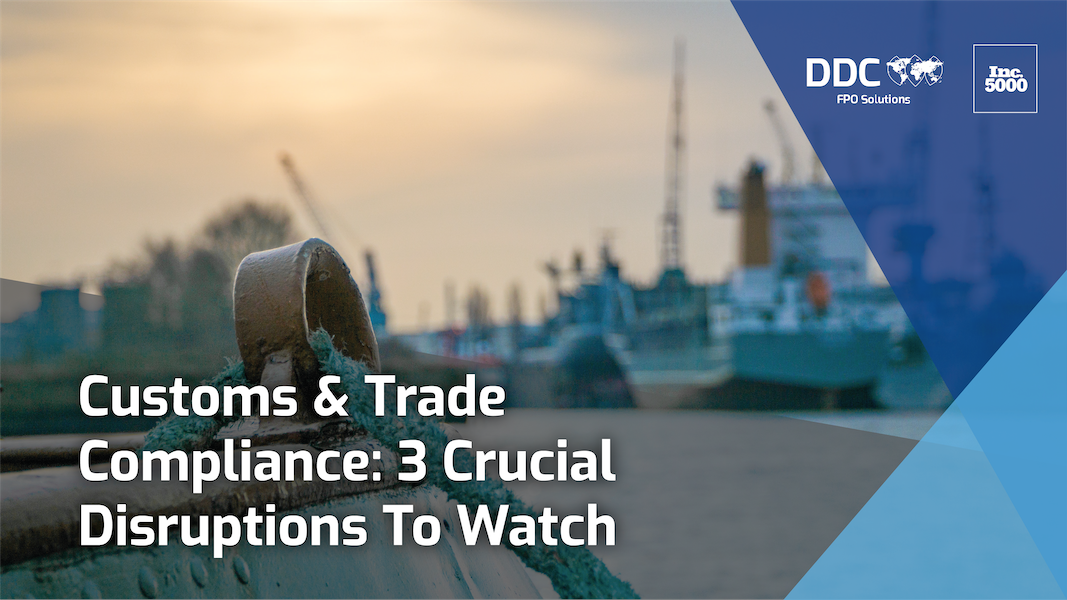Customs & Trade Compliance: 3 Crucial Disruptions to Watch

Freight evolves daily, but rarely has it seen as much volatility as in the past two years. A global pandemic coupled with three major disruptions to global trade deals leaves transport and logistics providers with a lot to keep up with, especially regarding customs compliance, brokerage, and shipment processing.
Here are three customs & trade compliance regulations that are changing the international shipping landscape.
1. Brexit is driving uncertainty among international shippers and logistics companies
On January 1, 2021, the transition period with the EU will end, and the UK will operate an external border as a sovereign nation. Despite the pandemic complicating many things about the nature of Brexit*, there is no sign of an extension, and customs brokers still have not been trained and operators don’t know what information is required or how legislation will be enforced.
According to Logistics Manager, COVID-19 has impacted available capital and has derailed Brexit preparations, preventing businesses from investing in new customs processes or stockpiling to protect themselves against disruption to supply chains. An October survey of UK supply chain managers found 46% were less prepared for Brexit than last year due to the pandemic.
International shipping experts say that completing a typical export declaration post-Brexit can require more than 50 pieces of information on transport, commodity codes, and value. What's more, the logistics industry estimates an additional 215 million customs declarations will need to be filled in each year after Brexit.
The Brexit guidance being issued by the UK government is to “get someone to deal with customs for you.” However, officials warn that what third parties can do (and who will be liable) depends on the services they provide and the commercial agreement in place.
If you partner with an outside organization to assist with Brexit-related changes, be sure to choose one that specializes in international shipping and customs brokerage processing with multilingual proficiency. An experienced business process outsourcing (BPO) partner can provide the support your business needs during this transition period and beyond.
*For an extensive overview of what you need to know about Brexit, explore this recently published Brexit guide.
2. The Trans-Pacific Partnership (TPP) becomes the and Progressive Agreement for Trans-Pacific Partnership (CPTPP)
After the U.S. withdrew from the TPP, the remaining countries continued to negotiate the deal, renaming it the CPTPP, and shipping and logistics firms were left contending with an entirely new and complex structure of tariffs for goods moving into and out of the region.
The countries involved account for 13.5% of global gross domestic product, representing the 3rd-largest trading bloc in the world, after the European Market and the USMC bloc. Unfortunately, the U.S. withdrawal has had some trade consequences on tariff rates and the U.S has higher tariffs than other countries. For example, agricultural tariffs are higher - with U.S. beef exports to Japan having a 38% tariff as opposed to the 9% tariff for Australia.
Additionally, some U.S. manufacturers are relocating operations to partner countries to claim the preferential tariffs, and it is worth noting that the Canada’s government is persuading them to do so.
Any changes to U.S. involvement in trade agreements have yet to be seen, but with a new political party taking office, the future is more uncertain than ever, and transportation providers are left treading water on tariffs as negotiations continue.
3. North American Free Trade Agreement (NAFTA) changes directly impact the transportation industry ecosystem
While the refurbished free trade deal between the United States, Mexica, and Canada (USMCA) looks a lot like NAFTA on the surface, there have been some changes to the agreement, which was ratified in January 2020 and took effect starting in July of this year.
Projections estimate that the USMCA will increase U.S. exports to its neighbors by $33M compared to the numbers under NAFTA. American Trucking Associations notes that “It is the first significant revision in our nation’s trading relationship in nearly three decades and will foster growth in all three nations at a time when the economy can use a shot in the arm.”
While this is especially good news for hauling companies, the deal limits the ability for Mexican carriers to move freight in the United States without going through a new approval process, and expressly forbids them from hauling “freight whose origin point both begins and ends in the United States.”
Just as it has with Brexit, COVID-19 has tempered some of the enthusiasm, as cash flows among businesses in the region have become more unstable. Businesses throughout the US. reported a 72% year-on-year increase in payment defaults, and while this is not exclusive to the freight industry, the effects are shared by all involved in the flow of trade among the countries.
These major changes in customs and trade agreements are only exacerbated by a global pandemic, and these new regulations (some implemented and others still in process) have significant impact on the process of customs brokerage and international shipping. Still, goods must get from point A to point B, and the freight industry must keep up with these changes to ensure their own businesses can operate as efficiently as possible amidst this relative upheaval.
Here are a few additional and resourceful articles on international shipping and customs brokerage hurdles:
Connect with Us
DDC FPO is a trusted strategic partner for transportation and logistics companies worldwide. Discover how we can help with customs and trade compliance.
How Can We Help You?
Get in touch to learn how we can support your success.
Get Started
